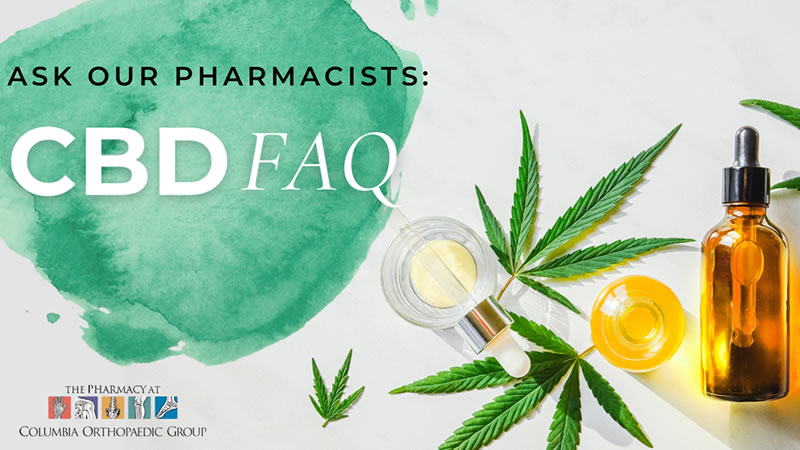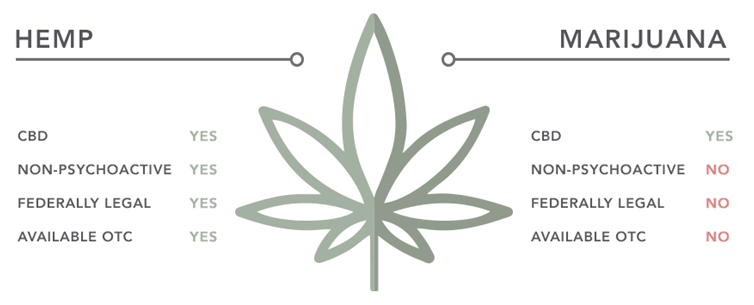
Ask Our Pharmacists: CBD FAQ
With the rise in popularity of CBD comes the buzz around pain relief, better sleep and reduced anxiety. However there are still many questions about this extract and how it works?
What is CBD? Where does it come from? And what's up with all the hype around it?
CBD's history, source and legality gets confusing quickly, but we're here to clear the air. Here are some frequently asked questions about CBD and answers from our Columbia Orthopaedic pharmacists. You can shop our professional-grade full spectrum products here.
Our physicians and pharmacy began receiving a lot of questions regarding CBD products & in response to these questions, we felt it was important to provide quality education to our patients.
We have partnered with Ananda Professional to begin offering pharmaceutical grade (or high quality) hemp derived CBD products to our patients and community. Ananda Professional understands the importance of patient education and markets a fully compliant and legal CBD oil product line created specifically for independent pharmacies and healthcare professionals.
Here are addressing some of the common concerns and misconceptions regarding CBD, hemp & marijuana.
What is CBD?
Cannabidiol (CBD) is a chemical in the Cannabis sativa plant, also known as cannabis or hemp. CBD is a completely non-intoxicating cannabinoid found in both hemp and marijuana, known for its health promoting benefits. The 2018 Farm Bill officially legalized CBD on a federal level as long as it is derived from hemp (as opposed to marijuana) and as long as the hemp plant from which it was derived contains less the 0.3% THC.
How does CBD work?
Just like all mammals have a digestive system, an immune system, and a cardiovascular system-- all mammals also have an endocannabinoid system. However, the endocannabinoid system was only recently discovered in the 1990s and scientists and researchers are only just beginning to fully understand this complex system. We have cannabinoid receptors throughout our entire body including the brain, connective tissue and immune cells to name a few.
These receptors help our body manage the processes that govern pain, emotions, appetite, focus, memory, the immune system and other functions. The body produces its own endocannabinoids that bind to these cannabinoid receptors and act as chemical messengers to promote balance within the body. Deficiencies in our own bodies production of endocannabinoids lead to imbalance and can make our bodies vulnerable to disease.
CBD works with these receptors to help the body help itself to produce a variety of potentially positive benefits. That's why studies have shown it to be universally beneficial for such a wide variety of ailments. Essentially, CBD can be shown to help make up for this deficit.
Plant-derived cannabinoids, called phytocannabinoids, can help support the body's endocannabinoid system either directly by binding to cannabinoid receptors throughout the body or indirectly by preventing the body from breaking down its own endocannabinoids. CBD does not bind to endocannabinoid receptors directly, but rather prevents the breakdown of our natural endocannabinoids ensuring we have enough of our own natural chemical messengers to properly regulate sleep, stress, appetite, mood, pain etc. Because CBD does not directly bind to our endocannabinoid receptors, it does not produce the intoxicating "high" that is associated with marijuana use.
What is the best way to take CBD?
There are a wide range of available dosage forms, from topical creams and salves, capsules and oral tinctures, and it can also be useful to get some education on which formulation might be most appropriate for you and how to get the most benefit from the product you choose.
Do CBD products contain THC?
There may be instances where a CBD isolate (sometimes also labeled as THC free) may be appropriate. A true full-spectrum hemp oil will likely contain very trace amounts of THC (if you remember from the previous video, hemp-derived oils are legal as long as they contain less than 0.3% THC). While these trace amounts of THC are not enough to produce any sort of "high", there is a potential with sustained use that one could test positive on a urine drug screen for THC. This is something consumers should be aware of and educated on, especially if you are subject to drug testing by your place of employment.
What's the difference between Cannabis, hemp and CBD?
Cannabis sativa L refers to family of plant and underneath Cannabis sativa L there are two different types of groupings, one is marijuana and one is industrial hemp.
The main difference between marijuana and industrial hemp is their cannabinoid profile — marijuana tends to be very high in THC content whereas hemp generally contains very little THC.
While there have been over 100 different cannabinoids identified, THC and CBD are the two most understood cannabinoids. THC is the cannabinoid responsible for producing a "high" and CBD is a completely non-intoxicating cannabinoid found in both hemp and marijuana, known for its health promoting benefits. The 2018 Farm Bill officially legalized CBD on a federal level as long as it is derived from hemp (as opposed to marijuana) and as long as the hemp plant from which it was derived contains less than 0.3% THC.
What is the difference between hemp and marjiuana?
A product that is labeled CBD or CBD oil should in fact contain the cannabinoid CBD; however, a product labeled hemp oil or extract may or may NOT contain any CBD. Which part of the hemp plant the oil is derived from will determine whether or not the oil actually contains any cannabinoids such as CBD. If the product says hemp oil or hemp extract, but has no mention of active cannabinoids there is a good chance the product doesn't contain any CBD.
A product labeled as full-spectrum will generally contain CBD as well as the many other beneficial cannabinoids and phytonutrients available from the hemp plant. A CBD isolate means that the manufacturer has extracted the oil from the hemp plant and then processed the oil in a way as to remove and isolate the CBD from the rest of the plant nutrients. Many leading researchers in the field prefer the full-spectrum products to the isolates because the additional cannabinoids and phytonutrients are thought to boost the effects of CBD and provide greater health benefits.

What's the difference between CBD VS. THC?
CBD: Not psychoactive
- Will not (and cannot!) get you high
- Therapeutic potential: anti-inflammatory, pain relieving, immunomodulating, anti-anxiety, etc.
- Risks: minimal; possible drug interactions, hepatic toxicity
THC: Psychoactive ("high" effects")
- The compound that elicits the high in marijunana
- Highly regulated
- Federally illegal
- Therapeutic potential
Will I fail a Drug test?
There may be instances where a CBD isolate (sometimes also labeled as THC free) may be appropriate. A true full-spectrum hemp oil will likely contain very trace amounts of THC (if you remember from the previous video, hemp-derived oils are legal as long as they contain less than 0.3% THC). While these trace amounts of THC are not enough to produce any sort of "high", there is a potential with sustained use that one could test positive on a urine drug screen for THC. This is something consumers should be aware of and educated on, especially if you are subject to drug testing by your place of employment.
What is full spectrum hemp extract?
A product labeled as full-spectrum will generally contain CBD as well as the many other beneficial cannabinoids and phytonutrients available from the hemp plant. A CBD isolate means that the manufacturer has extracted the oil from the hemp plant and then processed the oil in a way as to remove and isolate the CBD from the rest of the plant nutrients. Many leading researchers in the field prefer the full-spectrum products to the isolates because the additional cannabinoids and phytonutrients are thought to boost the effects of CBD and provide greater health benefits.
Why are some CBD brands more expensive than others?
The information on CBD can be overwhelming and often seem to be contradictory depending on which source you read. To make matters even more confusing there are several terms that are often used interchangeably – although they may not actually be the same thing.
CBD products contain a variety of names on the packaging from CBD oil, Hemp oil, hemp extract, full-spectrum hemp oil, CBD isolate, and the list goes on… So what exactly is the difference and does it matter?
Today more and more people are in search of alternative therapies to treat various ailments or to promote general wellbeing, and unfortunately there are so many companies looking to capitalize on this market and CBD products are no different. Various shops are popping up all over the place advertising that they sell CBD, not to mention the many online options available.
Consumers need to be aware that currently there is no standardization or regulation on CBD products and therefore not all CBD products are created equal. Due to the lack of standardization some companies, such as the one we have partnered with, have taken it upon themselves to do their own quality analysis. Ananda professional has their quality analysis performed by a third party lab on each batch of product produced to ensure compliance with the Farm Bill, to ensure dosing matches their packaging and to provide consumers with the peace of mind that their product does not contain harmful chemical residues from herbicides and pesticides.
In addition to the importance of obtaining CBD products from a reputable, quality source, we believe it is also important to have some guidance from a health care professional before starting a CBD regimen to ensure it will not interfere with any of your current medications or medical conditions.
Remember, quality over quantity!
Virtual Webinar
The rise in popularity of CBD has led to an enormous amount of retailers and online shops entering the CBD retail space. Widespread availability and a lack of standardization and regulation within the industry often contributes to confusion among consumers.
Watch CBD Webinar
Who to trust for CBD?
Here at the Pharmacy at COG we are excited to be offering a line of high quality CBD products while also being able to provide education and guidance to our patients and those in our community.
Pharmacy Hours M-F 8 AM- 5 PM
